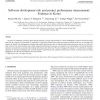Free Online Productivity Tools
i2Speak
i2Symbol
i2OCR
iTex2Img
iWeb2Print
iWeb2Shot
i2Type
iPdf2Split
iPdf2Merge
i2Bopomofo
i2Arabic
i2Style
i2Image
i2PDF
iLatex2Rtf
Sci2ools
JSS
2007
2007
Software development risk and project performance measurement: Evidence in Korea
As more US companies outsource their software projects overseas, they find that it is more challenging to control software development risk in countries with dissimilar IT capabilities. Using data collected from software projects developed in Korea, we investigate the impacts of specific risk management strategies and residual performance risk on objective performance measures such as cost and schedule overrun. Our results indicate that, unlike subjective performance measures, our objective cost and schedule overrun performance measures are positively associated with residual performance risk in Korea. We also investigate the impact of two alternative conceptualization of software development risk on both objective performance and subjective performance. Finally, we discuss relevant policy implications for software development and outsourcing. Ó 2006 Elsevier Inc. All rights reserved.
| Added | 16 Dec 2010 |
| Updated | 16 Dec 2010 |
| Type | Journal |
| Year | 2007 |
| Where | JSS |
| Authors | Kwan-Sik Na, James T. Simpson, Xiaotong Li, Tushar Singh, Ki-Yoon Kim |
Comments (0)

